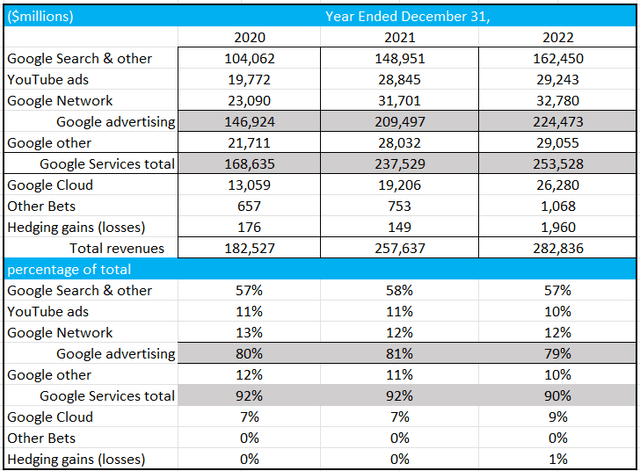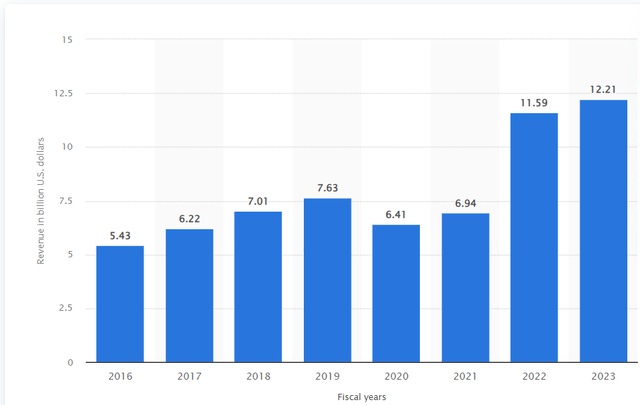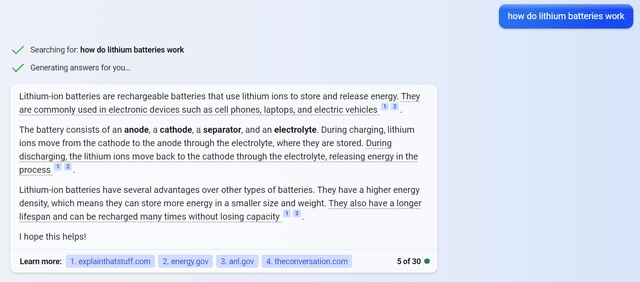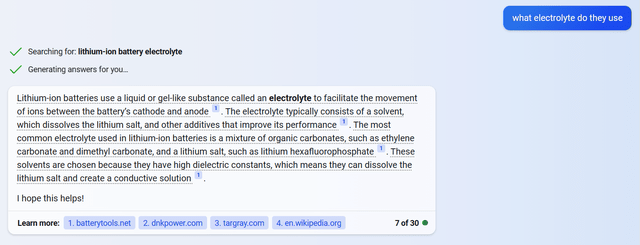Summary:
- Microsoft’s improved ChatGPT-enabled search engine poses a significant threat to Google’s dominance in the search market.
- Regulatory cases against Alphabet may further benefit Microsoft’s Bing-Chat product and lead to a shift in market share in my view.
- If Google loses the case and Bing Chat gains widespread acceptance, Alphabet may experience a major drop in search engine income.
Divaneth-Dias/iStock via Getty Images
I believe the Google search engine, the primary revenue driver for Alphabet (NASDAQ:GOOG) (NASDAQ:GOOGL), is about to see a significant drop in income. An improved ChatGPT-enabled search engine from Microsoft (NASDAQ:MSFT) will benefit from both EU and US antitrust cases against Alphabet. I believe the Microsoft Bing-Chat product is so good that it will capture market share from Google regardless. Still, take-up will accelerate if the regulators force Alphabet to stop making Google the default search engine on its Android operating system.
Justice Department sues Alphabet
In January 2023, the US Department of Justice sued Alphabet. The case came to court in September and is still ongoing it claims that
Through Serial Acquisitions and Anticompetitive Auction Manipulation, Google Subverted Competition in Internet Advertising Technologies
The complaint continues with:
Google has sought over 15 years to eliminate or severely punish its competitors across the digital advertising market……. Google has more than 90% of the search market and has maintained this position by locking out other search engines and ensuring whatever device or software they use they end up seeing Google search results.
The case reminds me of 2001 when the US government took on Microsoft for linking Internet Explorer to its Windows operating system, effectively eliminating its most prominent competitor, Netscape. Microsoft had been late to the internet party.
Netscape Navigator got Microsoft’s attention, and Bill Gates sent a famous memo to executive staff called “the internet tidal wave.” It was a confidential memo but became part of the antitrust case against Microsoft. According to the antitrust case, Microsoft built Internet Explorer and set out to obliterate Netscape by incorporating it into the Windows operating system.
Microsoft’s strategy worked, IE became the dominant browser, and Netscape was destroyed.
Microsoft lost the case, and the trial judge ordered that the company be broken into two separate entities. Following an appeal, a lesser sentence was imposed, and Microsoft agreed to open its code, limit the visibility of certain Windows features, and remove some contractual practices. It was the beginning of the end for Internet Explorer
Because IE had been dominant, Microsoft had not improved it sufficiently. When new browsers appeared, we had Opera, Safari, Firefox (from the same people who gave us Netscape Navigator), and finally, Google Chrome. Internet Explorer looked increasingly dated. The new browsers and Microsoft’s legal requirement to no longer have IE as a default started a slow demise, and eventually, Microsoft killed off IE.
I believe the parallel between the Microsoft Anti-trust case and the Alphabet one is clear: Google produces the Android operating system and makes its search engine the default setting. Of course, a large section of the phone market uses IOS, not Android, but Google uses its financial might to get the same result. It pays Apple an estimated $18-$22 billion annually to make Google the default search engine on Apple iOS; the DOJ puts the figure at $10 billion.
If Google loses the case, Alphabet and Apple may lose a lucrative revenue stream.
One notable difference between the Microsoft 2001 case and the Alphabet 2023 case is press coverage; when Microsoft was on trial, it was front page news, while the Alphabet trial is effectively being held almost in secret. The judge has accepted Alphabet’s view that they may be caused competitive harm by the disclosures needed for him to decide.
Before Google
For those old enough to remember the days of BG (Before Google), we remember a search engine war; several players were trying to establish a user base. I was using Excite, but the office favorite at the time was AltaVista; my wife liked Ask Jeeves, but many preferred Yahoo.
When Google arrived, it was an instant success. It was just better; based on a linear program (a mathematical tool for optimization problems), its page ranking system made the results far superior to what any other search engines could deliver.
Google became the default search engine for many because it was the best search engine. I don’t think that is the case any longer; it has evolved into a bloated money-making version of what it was. Google has 92% of the search market, and it accounts for 57% of Alphabets’ revenue. The original Google creators had been anti-advertising and, in 2005, had promised never to show banner ads. Google search now seems designed to generate cash; it takes you to YouTube, Google Maps, and Google Flights. The page ranking system has been altered over the years but is, to the user, unchanged, a list of web pages, and most users choose the first one on the list. I think Google is now the most popular engine because it is the default setting, not because it is the best.
Microsoft and the AI search engine revolution
Microsoft began investing in OpenAI (the developers of ChatGPT) in 2019. In January this year, they confirmed that the investment was now up to $10 billion. Microsoft will receive 75% of its investment back and ultimately own 49% of OpenAI. Microsoft intends to use ChatGPT across many of its products, but this article looks only at the Bing search engine.
Microsoft’s search engine, Bing, has improved enormously since its launch in 2009; its latest iteration, Bing Chat, leapfrogs the technical superiority Google has enjoyed for so long. Search is essential; you need to get answers to questions, and Bing now facilitates this in a way that seems light years ahead of Google. Microsoft has incorporated ChatGPT into its search engine; it gives answers to questions, not just page results for you to find an answer. You can interact with Bing and have a conversation with it.
The following is a short example of how it works; my questions are in dark blue, followed by the Bing response.
When you have the first piece of information, you can ask follow-up questions. The AI-powered Bing Chat remembers what you are looking into and provides relevant contextual answers.
The huge advantage is that you get answers to questions, not just places to look for answers. I think this is a search game changer and that people will quickly convert to Bing, just as quickly as we all moved to Google when it first arrived.
The Impact
Google search is Alphabet’s main revenue generator.
Google Revenue (Author Database)
Google search alone accounts for 57% of total revenue. Any significant loss of search engine income will have a major effect on Alphabet’s total revenue, and with it will come a drop in share price. A 10% drop in search income would result in a loss of $10-$15 billion in revenue.
Microsoft’s income from search has been growing.
Microsoft Search Revenue (Statista)
Here is a link to the Statista report.
The forecasted increase of $0.7 billion in 2023 could be a severe understatement. If Bing Chat becomes widely accepted, I think the potential growth could be in the tens of billions. If Alphabet loses 10% of its search revenue, it could potentially help double Microsoft’s search revenue.
Conclusion
Alphabet’s search engine monopoly is under attack on multiple fronts.
The US government is looking at its monopoly on Android phones and its methods to dominate Internet advertising.
European regulators have investigated and found things against Alphabet. The findings are currently under appeal, but billions of dollars of fines have been issued.
If history is anything to go by, these regulators will force Google to open up its software and stop it from setting Google Search as a default.
In my view, the second technological threat is just as real. Microsoft has invested heavily in ChatGPT and developed a superior search engine product in my opinion. Many people will find it far more convenient to ask a question and get an answer rather than a list of websites to visit, and the chat interface allows for follow-up questions. It is quicker and easier to get the information from Bing than Google.
Google made itself the world’s most popular search engine by being better than the rest and providing better answers. Bing is now in that enviable situation, and Microsoft may even benefit from the regulatory investigations currently underway in the US and EU.
I hold both Alphabet and Microsoft in my long-term family fund. I have reduced my holding in GOOG by 25%, increased my holding in MSFT to the maximum allowed, and used the extra cash to add NPWR to the fund. The Family fund was started by my grandfather and passed to me by my Father. This is the only change I have made to it in 2023.
Analyst’s Disclosure: I/we have a beneficial long position in the shares of MSFT, GOOG either through stock ownership, options, or other derivatives. I wrote this article myself, and it expresses my own opinions. I am not receiving compensation for it (other than from Seeking Alpha). I have no business relationship with any company whose stock is mentioned in this article.
I am long Microsoft and Alphabet, I do not recommend taking a short position in Google.
Seeking Alpha’s Disclosure: Past performance is no guarantee of future results. No recommendation or advice is being given as to whether any investment is suitable for a particular investor. Any views or opinions expressed above may not reflect those of Seeking Alpha as a whole. Seeking Alpha is not a licensed securities dealer, broker or US investment adviser or investment bank. Our analysts are third party authors that include both professional investors and individual investors who may not be licensed or certified by any institute or regulatory body.


